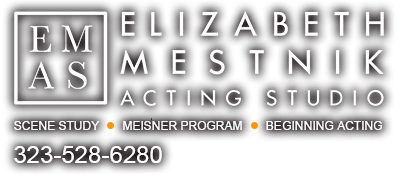FALL 2011 CLASS SCHEDULE
Advanced Scene Study 14 Weeks Starting Monday September 12th
Mondays 7pm $620
Meisner Training Program – 9-month program begins September 17th
First Year – $295/month
Session A: Mondays and Thursdays 10am
Session B: Tuesdays 7pm and Saturdays 10am
Second Year – $290/month
Wednesdays 7pm and Saturdays 1:30pm
Technique Series for Beginning Actors – 11 weeks starting September 22nd
Acting Foundations: Thursdays at 7pm – $500

ELIZABETH MESTNIK
Director
EMAS
323-528-6280
www.emasla.com
Upcoming Workshop
|
Commercial Casting Director Chris Game will demystify the commercial business as well as give you valuable practice in simulated audition sessions. One of L.A.’s busiest casting director’s, Chris’ clients have included Pepsi, Mercedes, Conoco, Taco Bell and many others. All students are put on tape to help critique your needs and progress.This 4-week class teaches the techniques needed for booking commercials: Chris will go over every possible type of audition and show you how to work in the audition environment. Issues addressed include:
Camera Techniques This is a great workshop to increase your auditioning confidence, network with a top casting director and to equip you with the techniques you need to be a successful commercial actor. Anyone with prior commercial experience or past commercial workshops will be given more challenging materials – so this is appropriate for both new and experienced actors. |
|
WHEN: Mondays at 7pm – August 8, 15,22, and 29, 2011
WHERE: EMAS: 7600 Melrose Ave, 2nd Floor Los Angeles 90046
COST: $175
CONTACT: 323-528-6280 or [email protected]
|
Beyond Repetition – by Elizabeth Mestnik
“To Behave Truthfully under Imaginary Circumstances” – Sanford Meisner’s 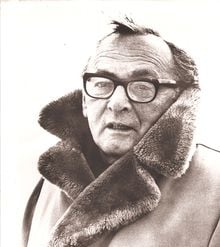 definition of acting.
definition of acting.
The Independent Activity is the next step after the basic repetition exercise. It is the phase of the work that really brings home what it means to “behave truthfully”. In this phase of the work a student is asked to do a physically difficult task, something that takes 110% of their concentration to achieve. This is a surprise to actors who in the past have only “pretended” on stage before – “pretended” to read a letter, or “pretended” make lunch. Here any activity they do they have to REALLY do it. To help their concentration we give the activity certain guidelines, which we introduce one at a time:
- A standard of perfection that lets us know if we are succeeding with the activity. For example, it’s not enough to build a house of cards, the student must get more specific, ie: build a 3-story house using all 52 cards.
- A simple and specific reason for needing to do the activity.
- Urgency: which means they know how much time they need to get this activity done; no more and no less.
An activity that does not integrate all of these criteria is not acceptable, and the student starts to learn how to hold themselves to high standards. Any holes in the crafting will keep the improvisation that is to come from fully developing. It will hurt their acting.
Skills learned through The Independent Activity:
- It grounds the student in the reality of doing. Nothing we do in these first steps is pretend. What that means is that they learn how to really do something under imaginary circumstances. If they choose to paint a picture, they really paint, and really give themselves a standard of perfection to help them know if they are succeeding or failing.
- It reveals that emotion is a by-product of DOING. The more they REALLY do the activity, and the more they struggle with it, the more likely REAL emotional life will start to emerge (usually frustration).
- It teaches that the more specific the actor is in his or her crafting, the easier it is to believe in the imaginary circumstances.
- It begins the exploration of what makes the actor tick, what pushes each individual actor’s emotional buttons. As we start to make the reasons for doing the activity have greater importance (what we call raising the stakes) the actor is forced to craft from personal feelings – what makes them angry, or scared, or exhilarated.
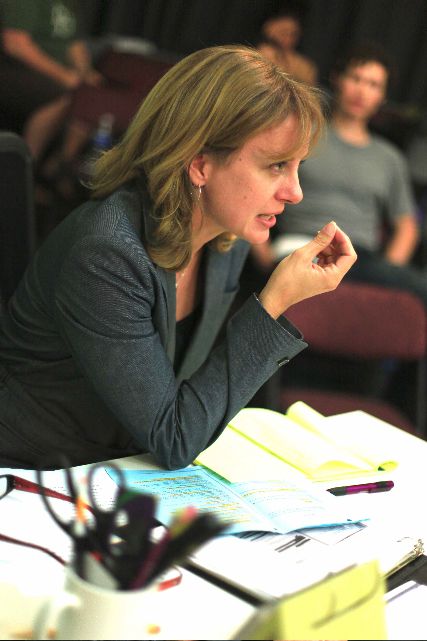 While this actor is working on their independent activity, their partner will start the repetition exercise – and we learn that acting means you must DO and you must also work off of your partner – and neither can be sacrificed. It’s very difficult to do. The actor with the independent activity will want to tune their partner out in order to work on their activity, or they will stop working on their activity in order to work off of their partner – and yet they cannot do this – they must do both. This creates an innate push and pull for the actor “I need to get this activity done, but this other person is demanding my attention and keeping me from succeeding”. It ultimately will create a conflict between the partners. Believe it or not – these exercises were developed to create conflict because acting is full of dramatic fights. As an actor we must embrace conflict in a scene. In the real world many of us avoid conflict at all costs, but as actors we have to be comfortable living in the drama. The Independent Activity also teaches the actor to:
While this actor is working on their independent activity, their partner will start the repetition exercise – and we learn that acting means you must DO and you must also work off of your partner – and neither can be sacrificed. It’s very difficult to do. The actor with the independent activity will want to tune their partner out in order to work on their activity, or they will stop working on their activity in order to work off of their partner – and yet they cannot do this – they must do both. This creates an innate push and pull for the actor “I need to get this activity done, but this other person is demanding my attention and keeping me from succeeding”. It ultimately will create a conflict between the partners. Believe it or not – these exercises were developed to create conflict because acting is full of dramatic fights. As an actor we must embrace conflict in a scene. In the real world many of us avoid conflict at all costs, but as actors we have to be comfortable living in the drama. The Independent Activity also teaches the actor to:
- Stand up for themselves and find their voice
- Work from a place of sensitivity and compassion
- Craft from what has real meaning for them but not from real life. Acting is always imaginary and if we use real life drama that is not acting, and not a healthy way to work
Emotional Preparation comes next – and that is the very personal technique that we use to get to a heightened emotional state, on our own, without the assistance of an activity or a partner. It is self-induced emotional life. It’s not our favorite way to connect emotionally but it’s important to be able to do this when the actor has to start a scene already fully alive. This happens all the time in film shoots where filming may pick up over and over again in the middle of a scene. We do this work so that the actor develops an entire repertoire of emotions to bring to the imaginary circumstances. The week–in, week-out emotional workout also helps our emotional life to be easily called up at a moments notice. We can create any emotional life that the character might demand.
The Domestic Exercise comes next – this is when the students start to create different relationships with their partners. We make sure that the actor doesn’t lose their moment-to-moment connection for the sake of a full emotional life. Emotion is seductive when it first starts to come up, it feels good to feel! But an audience doesn’t want to sit there watching someone emote. They want to see what the character does THROUGH the emotion. The actor has to be reminded that acting is not emotion but that the emotion will inform how the actor DOES something. Emotion without doing is not acting.
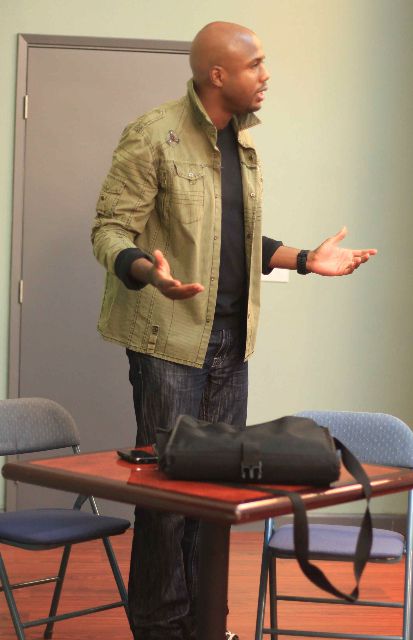 Finally, we introduce the Shared Circumstances. With this work, actors start to think like actors, learning how to ask the right questions and flesh out the scenes. They get more specific about their relationships, and strengthen their points of view. They start to work on objectives from an organic approach rather than in intellectual one. This is when each actor’s uniqueness really starts to shine. All the while the student must NEVER lose the essential idea that everything you do is in RESPONSE to your partner, moment to moment. It’s what we developed through the repetition exercises, and just because we’ve moved on to other steps – we can never lose that foundation. Day in and day out, in these improvisational scenes that are built from the repetition exercise, the actors get to:
Finally, we introduce the Shared Circumstances. With this work, actors start to think like actors, learning how to ask the right questions and flesh out the scenes. They get more specific about their relationships, and strengthen their points of view. They start to work on objectives from an organic approach rather than in intellectual one. This is when each actor’s uniqueness really starts to shine. All the while the student must NEVER lose the essential idea that everything you do is in RESPONSE to your partner, moment to moment. It’s what we developed through the repetition exercises, and just because we’ve moved on to other steps – we can never lose that foundation. Day in and day out, in these improvisational scenes that are built from the repetition exercise, the actors get to:
- Expand their emotional lives.
- Exercise their imaginations.
- Hone their crafting.
- Find their unique voice.
It’s an intense and challenging program, but those who dedicate themselves to this work will never be the same, as actors, as artists or as people.
Stay tuned – our next discussion will be about how Scene Work is integrated into the first year of Meisner Technique.
Article written by Elizabeth Mestnik
What does the Meisner Technique Teach?
The Repetition Exercise and How it Works:

I’m asked all the time “What do you teach actors? What do you learn in a Meisner Technique program?” I mean truly, the skill sets required of actors are often not visible to the untrained eye, the best acting is invisible, it looks just like real life, so I am not surprised that the beginning acting student isn’t sure what it is they need to learn to become a truthful exciting actor. So I usually explain to them that we teach you how to be truthful in your acting, you learn how to act from your instincts and not your head, we fine tune your ability to be in true contact with another actor, how to tap into your imagination to emotionally connect to the dramatic circumstances of the script, you learn to sensitize to the world around you so you can walk in your character’s shoes with emotional truth and integrity…and at some point in this long list they interrupt and ask “how do you do that?” . And that is where it gets tricky, because as “simple” as the Meisner Technique’s structure is, it’s ramifications are profound and address so many of the actor’s needs – it’s difficult to sum it up in a brief conversation. The best way to understand the work is by reading one of the two great books on the process, –William Esper’s book “The Actor’s Art and Craft” or, of course, Sanford Meisner’s book “On Acting”. But these conversations have gotten me to thinking that maybe we could give people a skeletal understanding of the Meisner steps and what skills they address. I do this because it is important for us to understand that the skills actors need go way beyond memorizing lines and hitting your mark.
The Repetition Exercise is the most well known phase of Meisner’s work and it lays a really important foundation for the more complex exercises and important scene work that comes down the road.
For me the Repetition exercise has 3 phases:
- Objective Repetition without changes
- Objective Repetition with changes
- Subjective Repetition with changes
All of which develop the actor’s ability to work off of their partner, work impulsively and stand up for their own feelings. Here is how this little repetition exercise does all that.
The Objective Repetition without changes, starts with someone commenting on the first thing they see in their acting partner and then their partner repeating what they said and this repetition of the same observation goes on and on – it’s a simple but very powerful exercise that teaches actors
- How to honor their impulses by commenting on the first thing they notice– honoring what they really see before the sensors of politeness and manners set in. Contrary to mom’s advice we want you to speak before you think! We are teaching you to stop the judgment of your observations – so if the first thing they notice is “big nose” they have to say it! We are developing their ability to act from an impulse rather than their intellect, responding from the heart not the head. Just repeating also removes the need to come up with the words also helps keeps the student from thinking too much.
- How to put your focus and attention on one thing – their partner, and be able to read their partner’s behavior. In a time where we are always distracted, by an email, a phone call, a billboard, re-learning how to stay focused over time is an invaluable skill. Ultimately this is about connecting with another human being and allowing all other distractions to fall away so you can truly be present with someone else, truly be affected by them, and live in the moment. Learning to put your focus somewhere outside of oneself is also an invaluable tool to calm nerves.
- How to allow yourself to be affected by someone else and how to give your body and voice permission to reveal how you are feeling. We are trained in life not to show our weaknesses, our worry, our vulnerability and that can create a lot of tension that keeps the actor from being expressive. We are trained in life to show only our “best” selves, but as actors we must show our “true” selves. Sometimes students become robotic in this first step for fear of not doing it right. We don’t care about being right we care about behaving truthfully. We remove the idea of being right or wrong and substitute the idea of either being present or not to your partner and to the moment.
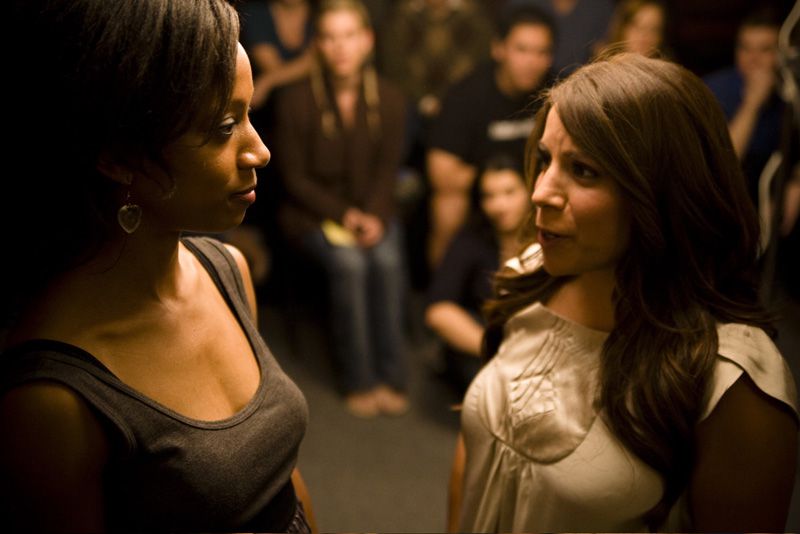 Repetition with changes. Now the actor is allowed to change the repetition when their partner inspires them to do so. It may be as simple as a fact “you scratched your nose”, or it may go deeper to “you are flirting with me”. At first whatever they notice and can put into words is valid. And when they can’t find the words, they continue to repeat. We want to make sure that they aren’t thinking before they speak and they aren’t intellectually searching for a way to change the repetition. It is better to just repeat than to intellectualize. This phase
Repetition with changes. Now the actor is allowed to change the repetition when their partner inspires them to do so. It may be as simple as a fact “you scratched your nose”, or it may go deeper to “you are flirting with me”. At first whatever they notice and can put into words is valid. And when they can’t find the words, they continue to repeat. We want to make sure that they aren’t thinking before they speak and they aren’t intellectually searching for a way to change the repetition. It is better to just repeat than to intellectualize. This phase
- Furthers the actor’s ability to read behavior, and now makes the actor commit to calling the behavior, without polite editing. Removing the editor in one’s mind is an important aspect of getting actors to be instinctual and emotional.
- Enhances the impulsive response, which is not within the actor’s control. Controlling the changes in the repetition exercise means the actor is still working from their head and aren’t completely free.
- Is the beginning step of the actors finding their own point of view, of really taking in how someone is behaving and having an opinion about it.
Subjective Repetition With Changes. Now instead of calling the first thing they see in their partner to start off the exercise, the actor is prompted to put their point of view out there – to have the courage to have an opinion about what they see. This can be a very difficult step – as we have been taught from a very young age to avoid being completely truthful when in dialogue with someone else. We are taught not to say anything that might make someone uncomfortable, and so saying what we really think is tough – and hearing it and really taking it in is also very tough. I once had a young man say to a really beautiful young woman “you are gorgeous”. It was completely truthful and heartfelt, and this beautiful young woman was completely overwhelmed by the honesty and genuineness that she welled up with tears. Why? Because the safe space of the classroom allowed he to let go of her defenses and show her feelings and because we don’t get opportunities for this sincerity very often in real life! But I say in this work we are not looking to behave as we would in real life – we want to be MORE TRUTHFUL than we are in real life. That is why audiences pay money to see us, because we will reveal to them something BEYOND what they experience in the every day. So this phase continues to solidify working from the instinct, and staying connected with the partner, but it’s most profound work is that it
- Teaches us to look for the TRUTH in all our work.
So that is the REPETITION EXERCISE broken down as simply as I am able. It is such an invaluable foundation to truthful, spontaneous acting – but it is only the beginning. Next I’ll talk about the Independent Activity, Emotional Preparation, Scene Work, Relationships and Shared Circumstances exercises. However, none of these more advanced exercises are doable unless the actor is able to work off of their partner, honor their impulses and have a point of view, all skills that are learned in the Repetition Exercises.
Article by Elizabeth Mestnik about the Meisner Technique.
Basics of the Meisner Technique
Great Acting Requires:
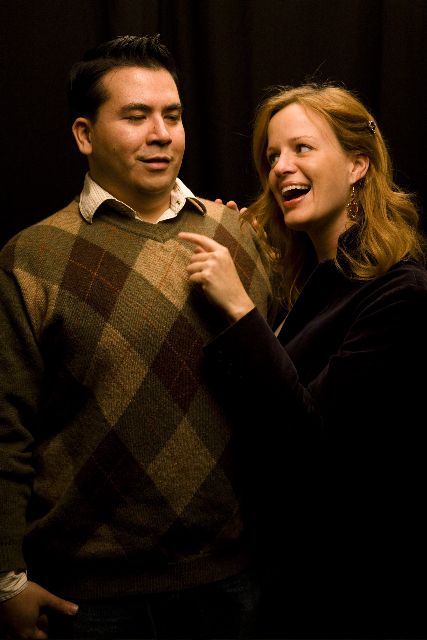 Connection: You must know how to listen and give yourself permission to be affected by your acting partners and the imaginary circumstances of the scene.
Connection: You must know how to listen and give yourself permission to be affected by your acting partners and the imaginary circumstances of the scene.
Focus: You must learn how to focus on something outside yourself and how to really do what you are doing… for real, no pretending.
Expression: You must constantly work on being free to express emotion: which means allowing your feelings to come out in behavior.
Self-Knowledge: Developing your Unique Point of View about the world: you must know how you feel about things, people, and the world around you and what defense mechanisms you use in the real world to keep these feelings at bay. These defense mechanisms must be stripped away before any truthful behavior can be revealed.
Impulsiveness: All good acting stems from an actors instincts, by honoring impulses and not intellectualizing the work. We need to learn to act from our gut not our heads.
And you must have trained body and voice that is strong and dextrous enough to do all of this.

Technique: (noun) A systematic procedure, formula or routine by which a complicated task is accomplished; the way in which the fundamentals, as of an artistic work, are handled.
All serious artists commit themselves to learning the technique of their craft, no one is asked to play a Bach concerto at their first piano lesson, but in many acting classes beginning students are given complex scenes on the first day – asked to perform them, given a few perfunctory notes, and this is considered acting training.
The Meisner Technique, however, takes the training of actors as seriously and as systematically as the training of dancers and musicians. As teachers of Sanford Meisner’s work, we consider a mastery of “technique” (the SYSTEMATIC procedure needed by actors to create great performances) absolutely necessary. The Meisner Technique is a systematic, step-by-step process that allows for actors to gain the skill sets required to create a character and live in the imaginary world of the play. The skills required to act go way beyond how to memorize lines and hit your marks.
Everything we do in the Meisner Technique takes us back to those 5 major skill sets – and so how do we gain skills? How does an NBA player improve his jump shot? Not in the game – but through drills, exercises and PRACTICE! – and that is how we improve our connection, our focus, our emotional expression our self-knowledge, and hone our instincts – PRACTICE!

“Future of Acting with Elizabeth Mestnik” web video promotion
Elizabeth Mestnik Acting Studio, a dynamic Los Angeles acting school, based in the heart of Los Angeles’ entertainment industry, announced today the “Future of Acting with Elizabeth Mestnik” promotion. Elizabeth Mestnik Acting Studio will award one lucky winner with a free admission to the Fall 2011 Acting Foundations Class (Value $530).
See our contest official page at and press release
Movie Ticket Giveaway – Win AMC Gift Cards
We’re excited to announce that we’re giving away two $25 AMC Gift Cards to the lucky winners of our March Giveaway (February 21st – April 1st, 2011)
All you have to do to enter is Connect with us on Facebook and/or Twitter and mention the Elizabeth Mestnik Acting Studio with a link to our site and why you think acting classes are important.
Fall 2010 Brag Sheet
The Elizbeth Mestnik Acting Studio (EMAS) isn’t just a Professional Acting Training Program. It is a community of actors, writers, producers and directors who are out there putting their stamp on the Entertainment Industry in Hollywood, New York and across the country. EMAS is proud of all the work current students and alumni are producing. Here’s a short list of what our members have booked, released, shot, performed, produced or developed in just the past 6 months.
Vanessa Alderete: Film: Confessions of a Gangster.
Glen Alexander: Founder Three Feathers Theatre Company
Sharif Atkins: TV: White Collar, The Good Wife, the Preacher’s Kid
Whitney Ayers: Theatre: Off Broadway: Sex, Relationships, and Sometimes Love, Renegade Theatre LA TAPE, Film: Egg Nog, A Brief History of Women.
Chris Bensinger: Broadway Producer: La Cage Aux Folles-TONY AWARD, American Idiot-TONY NOMINATION, Street Lights- New York Music Festival ’09
Jeannie Bolet: Film: Spiral, Strange Food, TV: All My Children, Webseries: After Hours. Signed with Val Maur Talent.
Nelson Domingo: Theatre: Actor’s Workout Studio’s The Comedy of Errors, Signed with JLA Talent, Founder of Three Feathers Theatre Company
Charles Davis: TV: The Game, Night and Day (tv movie), Signed with CESD.
Colin Day: Film: The Lonliest Road in America, Theatre: Elephant Theatre, Love Bites, Block Nine.
Allison Dykstra: TV: True Jackson
Silvana Gargione: LA Improv Fest and Boston Improv Fest. Theatre: Sylvia Plath is my Co Pilot.
Lily Holleman Film: UrFrendz, Kitty Kitty (short) (post-production), T.V. Southland, Tracey Ullman’s State of the Union ,Theatre: South Coast Repertory Circle Mirror Transformation (January 2010)
Jackie Kamm: Film: Nipples & Palm Trees.
Susane Lee: TV: True Jackson, TV movie: Kosher Pig
Cat Love: Founder Three Feathers Theater Company
Jordana Oberman Film: The Preening Swan (post-production), Mushroom Hunt (short). Theatre: Dear Harvey.
Ketryn Porter : Webisodes: The Alarmingly Charmingly Cousins, Klassy (in production) Pilot: Dudes in Toyland
Katie Ross: Film: Night Drive
Richard Robichaux: Film Lead: Bernie opposite Jack Black, TV: Better off Ted
Brad Schmidt: Broadway Debut: Lombardi
Lynn Trickey: Theatre: Actor’s Workout Theatre The Comedy of Errors, Signed with JLA Talent.
Billy Towers: Film: 3’s A Crowd , The Ghost Hunter.
Johnny Wactor: Film: Hold Up, Let Me Explain, Punctured, Golden Box, The Grass is Never Greener. Webseries: Hollywood Girl. Signed by Bobby Ball Agency
Ken Weiler: TV: Private Practice, Days of Our Lives, Film: Shrink
Christopher T. Wood: Film: Friends with Benefits , TV: Without a Trace
John Wilhovsky: Film: Young Again , Empress Vampire (post-production), The Gates of Heaven (short), 365 Days.
How to Win Over a Casting Director
Breaking into the film business isn’t the easiest thing to do in the world, but people continue to do it again and again.
So what’s the secret?
It comes down to three things: talent, experience, and luck.
This pretty much applies to just about every job in Hollywood, but especially for actors and actresses.
That’s why it’s hard – that’s not to say there aren’t talented individual people out there that find they’re most happy when they’re acting.
For the latter, there are a few things you can do to enhance your chance of winning over a casting director and their assistant during your next audition.
1. Let Your Talent Shine
One of the most important elements casting directors look for in actors and actresses is talent. They want to see that you have some sort of spark of talent that has the capacity to blow up and surprise us.
If you’re truly talented, and you’ll know because you’ll have tasted positive feedback, mild success, and other great things from your acting … even if you have yet to start pursuing it. As a child, did people suggest you become a movie star? Were people impressed with your personality or ability to act? If so, you’ve tasted the social proof that you entertain people.
Though this isn’t required, it’s often one of the signs that you really are talented.
2. Build Your Experience
Try to build your experience as much as possible. Talent scouts constantly lurk the crowds of shows and acting schools looking for that special someone they’d like to present to their client.
Do something so you can say you’ve done it. Perform in a show. Star in student films. Act as an extra. The key is to gain as much experience possible … and you should want to do this, not feel obligated.
Those scouts and agents are looking for you … help them find you. With just the right amount of luck, you’ll land representation and move on to bigger and better projects. The more you have on your resume, the more likely the casting director is to give you the opportunity to impress them with your performance.
Which brings us to the next point …
3. Make Your Own Luck
The more you do, the more likely you are to get lucky – that is, the more likely you are to bump into a producer, catch the eye of a scout, or land a roll with a project that actually goes to a festival.
Get out there and dig – success doesn’t come to people, people go to success.
This point doesn’t necessarily lead to impressing the casting director directly, but it might just lead to your casting director.
Overall, the idea is to walk into the casting office confident and ready to have fun. Build your experience, show your talent, and get a little lucky in the process and you might just impress the casting director enough to be called back for a second audition.
Article written by the Elizabeth Mestnik Acting Studio
LAX to the Elizabeth Mestnik Acting Studio Directions – by car
For those of you who are arriving from different cities, states or countries, we have included a easy directions map in google maps.
View Directions from LAX to the Elizabeth Mestnik Acting Studio in a larger map

